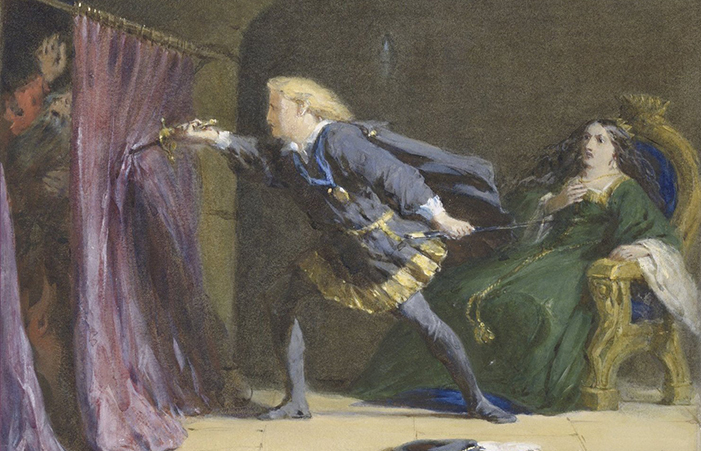Blogging Hamlet: Part 8

Maybe Shakespeare is not your thing, and that’s fair. In high school, he sure wasn’t mine. But I must say, “Elizabethan plays where the main character kills a man and then MAKES PUNS ABOUT IT” should ALWAYS be your thing, because that’s just good sense.
Last time, Hamlet murdered Polonius completely by accident and then wavered between 1) feeling bad about it, and 2) feeling like Polonius didn’t really deserve to be alive anyway. Here is a visual representation of what went down, wherein Hamlet looks like Prince Charming from the Shrek movies and Gertrude looks vaguely upset about what Hamlet just did to her curtains:
 Wikimedia Commons
Wikimedia Commons
In Act 4, Scene 1, Claudius says to his wife, “Hey, how’d that chat with Hamlet go?” and Gertrude says, “On a scale of one to ten? Like a four.”
Claudius asks how Hamlet is, but seriously, what kind of question is that? You know how he is, Claudius. He’s a lunatic, and now he’s gone and stabbed a secondary character.
Gertrude explains that Hamlet just murdered Polonius. Claudius is like 2% sad for his friend and 98% just glad it wasn’t him. He calls for Rosencrantz and Guildenstern, who materialize as if by magic, and he gives them what I personally think are very peculiar instructions. But to Rosencrantz and Guildenstern, I guess “Hamlet killed a guy, I need you to find the body” is just your everyday, run-of-the-mill errand not unlike swinging by the store for some milk. In any case, they have no follow-up questions. They don’t even have any dialogue. This is the scene, word-for-word:
CLAUDIUS: Ho, Guildenstern!
Enter ROSENCRANTZ and GUILDENSTERN
CLAUDIUS: Friends both, go join you with some further aid.
Hamlet in madness hath Polonius slain,
And from his mother’s closet hath he dragged him.
Go seek him out, speak fair, and bring the body
Into the chapel. I pray you, haste in this.Exeunt ROSENCRANTZ and GUILDENSTERN
I wish I had some minor characters in my life like these two. Alas, all I have is the guy at Subway who makes me my lunch every day, and my landlord who always forgets my name.
Now, I know what you’re thinking—that it’s almost inconceivable to think that two characters as competent and memorable as Rosencrantz and Guildenstern might fail in an endeavor as important as this, but boy, do they. I can only assume Plan A was “Just ask Hamlet where the body is,” and Plan B was “Ask again. See if he cracks.”
In Act 4, Scene 2, they locate Hamlet and open up with “What have you done, my lord, with the dead body?” It’s a bold strategy, diving in headfirst without so much as a preliminary “So what’s new? Commit any hilarious murders lately?” but if there’s anything we’ve learned on this whole crazy ride, it’s that Rosencrantz and Guildenstern are bold men, probably.
In a shocking twist, Hamlet does not tell them where the body is. Instead, he says he’s buried it in some undisclosed location. If this were an episode of Law & Order: SVU, the team would’ve found the body in about five seconds and figured out Hamlet’s laptop password to boot. But this is not Law & Order: SVU, and Rosencrantz and Guildenstern are both dumbly oblivious, so the conversation goes nowhere. They do manage to take Hamlet to Claudius, however, and Hamlet does manage to insult their intelligence three times in the space of about thirty seconds, so I guess everyone wins.
In Act 4, Scene 3, Claudius frets about what to do with Hamlet. He likens Hamlet to a terminal disease which requires either “desperate” treatment, or nothing at all. I suppose this is the Shakespearean equivalent of “Go big or go home.” (I don’t think Claudius really gets how diseases work, but it’s the sixteenth century, so I’ll give him a pass.)
Rosencrantz enters and says they’ve got Hamlet under guard, making it sound like they captured him after a worthy battle instead of just asking nicely.
Guildenstern brings him in. Claudius asks Hamlet where the body is, and because Hamlet is Hamlet, he replies with with a whopping, many-layered dad joke about death, worms, and religion.
CLAUDIUS: Where is Polonius?
HAMLET: At supper.
CLAUDIUS: At supper where?
HAMLET: Not where he eats, but where he is eaten. A certain convocation of politic worms are e’en at him. Your worm is your only emperor for diet.
What he’s saying here is that Polonius is underground being eaten by worms. However, Hamlet is also riffing off the Diet of Worms, which was the assembly in 1521 that decided Martin Luther was a heretic. You might remember him as the guy who got that whole Protestant Reformation thing off the ground. (Point of interest: Hamlet goes to university in Wittenburg, where the real-life Martin Luther was a professor.)
Hamlet then goes on a lengthy tangent about the cycle of life. Try to follow this logic:
- A worm eats a king
- A beggar may later use that worm to catch a fish
- The beggar could then eat said fish
- Thus, kings are no better than the human waste that moves through the “guts of a beggar”
- Basically this whole thing was just a really elaborate poop joke
Fed up, Claudius demands to know where Polonius is. Hamlet says, “In heaven,” but adds that if Claudius thinks Polonius is in hell, he can go check it out himself. Finally, he admits that if they don’t find the body within a month, they’ll begin to smell it under the lobby stairs. Claudius sends his men off to retrieve it.
Claudius tells Hamlet he’s shipping him off to England with Rosencrantz and Guildenstern because of all the trouble he’s caused. Hamlet is fine with this. Seems like he’s getting off real easy, considering he killed a man in cold blood and all.
But wait! As soon as everyone leaves, Claudius sends a letter to the king of England, begging him to kill Hamlet—to bring about his “present death.” He says, “Do it, England,/For like the hectic in my blood he rages,/And thou must cure me.”
THOUGHTS:
- I wonder if Hamlet knows he now has a target on his back. When Claudius tells Hamlet he’s being sent off to England, Hamlet says, “GOOD,” like a petulant child, and Claudius is like, “YEAH, YOU’D THINK SO, IF YOU KNEW WHY I WAS REALLY SENDING YOU.” Hamlet may be nuts, but he’s not an idiot.
- Speaking of religion, it’s no coincidence that Hamlet has spent his formative years getting an education in the birthplace of the Reformation. This was a time when people were grappling with different belief systems, which mirrors the frustrating chaos of Hamlet’s struggle between action and passivity—between free will and predestination.
- I cannot believe Hamlet made Claudius stand there and listen to Hamlet compare him to poop.
Catch up on parts 1 through 7 of Blogging Hamlet here, or go check out the SparkNote!















